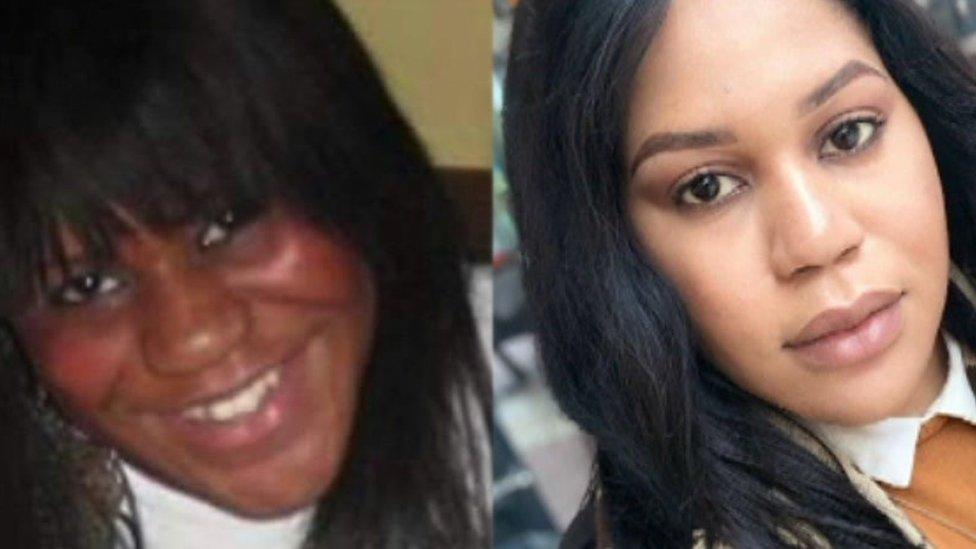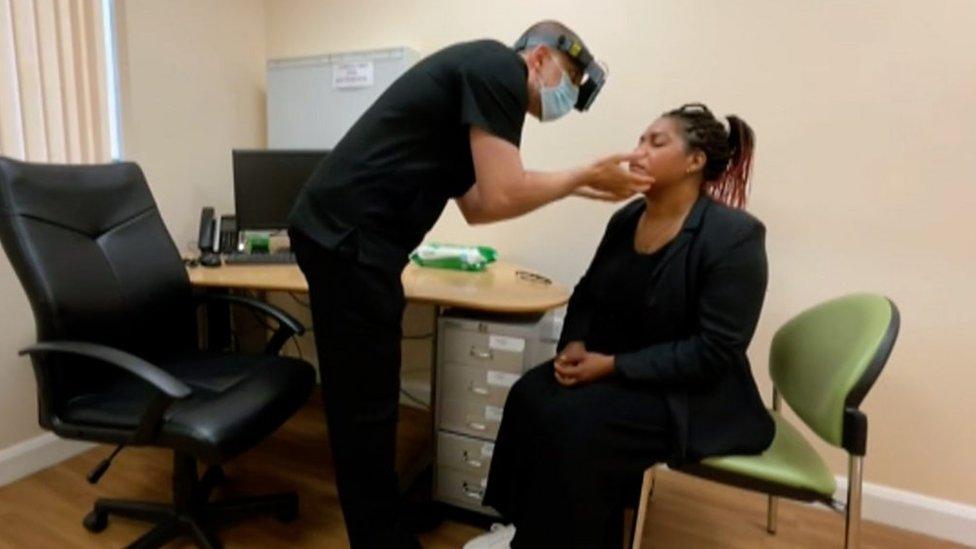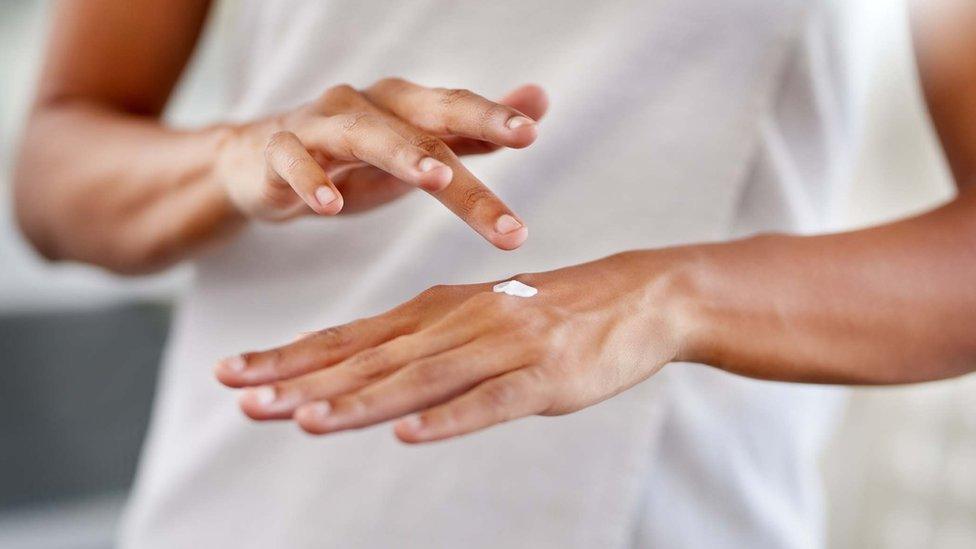Skin-lightening creams: Woman 'not recognised' by father
- Published

Grazia used skin-lightening creams for more than 10 years
A woman who used skin-lightening creams for more than a decade said her complexion changed so much her father no longer recognised her.
Grazia, from Bradford, West Yorkshire, was 18 when she started using the steroid cream in her daily routine, only stopping last year.
"When he saw me, he was shocked because I was really light," she said.
A BBC investigation found the prescription-only products were being sold under the counter in some shops.
The creams contain a powerful steroid - clobetasol propionate - usually used for short-term treatment of certain skin conditions such as eczema. The NHS recommends patients should normally use it for a just a week, external.
A side effect of the creams is that they can lighten the skin, so some people are using them in the belief they are beauty products.
Dermatologists have warned that long-term, unsupervised use can cause a range of skin problems.
'Is that really you?'
Grazia, now 29, moved from Italy to Bradford eight years ago, where she continued to use products containing clobetasol.
Due to living abroad, she would go for long periods without seeing her father.
"My dad once told me he didn't recognise me because we hadn't seen each other for two years," Grazia said.
"He was disappointed, sad and begged me to stop [using the creams]."
She had a "totally different skin colour" when she first started using the creams at age 18, she said.
"I used to think I was ugly," she added.
"It's upsetting me because I used it for so long. I think it's a process to start liking yourself."
Dr Walayat Hussain, a consultant dermatologist, agreed to see Grazia so he could examine the effects of her long-term steroid cream usage.
When he saw pictures of her at 18 years old and her natural skin tone, Dr Hussain did a double-take and asked: "Is that really a picture of you?"
Dr Hussain explained to Grazia the dangers the creams could pose.
Undercover journalists were able to buy the creams in six out of seven independent hair and beauty shops they visited across Yorkshire. In the seventh, the products were temporarily out of stock.
Dr Hussain said it was "really, really worrying" the creams were so readily available.
"These are prescription-only medications," he said.
"You should not be able to just go and buy them over the counter, as they can have serious consequences for the patients."
The skin-lightening creams were "the highest rung on the steroid ladder", he said, when compared with the relatively weak over-the-counter eczema creams containing hydrocortisone.
"So imagine using this without any understanding of what you're doing to your skin. It's really concerning," he said.
"A consumer wouldn't understand what clobetasol propionate is. They would think it's being marketed as skin-lightening cream, unaware that they are buying a very strong, potent steroid which could cause long-term issues."
Heather Nelson, from the Leeds-based Black Health Initiative community organisation, which aims to deliver equality in health and social care, said the scale of use of creams for skin lightening was "huge".
She added: "We cannot quantify it because people do not readily say or admit that they use these bleaching creams. Why do they use it?
"Because they're trying to achieve the euro-centric form of beauty. If they think that they want to go far in certain careers they believe they need to look a certain way."
'Become beautiful'

Binti Asumani started using skin-lightening creams two years after moving to the UK
Binti Asumani moved to the UK from Tanzania in 2013 with her husband and son. Two years later, she started using skin-lightening creams.
She said: "I wanted to change my colour because I saw my lady friends were light-skinned and I looked at myself and thought: 'Why should I not look beautiful?'"
Ms Asumani asked around to see where these products were sold and her friends directed her to the local market, where she was able to buy a strong skin-lightening cream.
Yet after using it for two years, she started to experience some unpleasant side effects.
"I started getting spots on my face and my eyes would always tear up and sting when I opened the jar of the cream," she said.
After going to a GP and showing her the cream, Ms Asumani was told to stop using it immediately. She said this was not easy for her and took a toll on her self-image.
"To become light skin, to become beautiful, it takes time but to stop it doesn't take time. I went back to my natural skin colour in about two months," she said.
"I felt bad, I stayed indoors for two months because I became darker than before."
Now she mixes the steroid skin-lightening product she has purchased from a local shop with another cream to stop her from "going back to my original dark skin".
She said she would love things to change before her daughter feels she wants to do the same.
"What is the point of continuing hurting because of beauty?," she said. "I hope my daughter understands that I have gone through the side effects of using these chemicals."

Corticosteroid abuse and potential side effects
•Skin thinning - the skin can become like tracing paper
•Problems with eyesight - increased risk of cataracts and glaucoma
•Skin is more prone to bruising and damage
•Patchy changes in pigmentation
•Stretch marks

The British Association of Dermatologists has called for tighter enforcement, and said "agencies both at a national and local level need to target the sale of illegal cosmetics in shops and online".
Chartered Trading Standards Institute (CTSI) chief executive John Herriman said: "Trading Standards departments across the country have undertaken investigations of businesses selling dangerous skin-lightening products and have delivered hefty fines and even prison sentences in the past few years.
"However, there is still much more to do. The public must report their concerns to the authorities so that enforcement agencies can paint a full picture of the scale of these issues and take appropriate action".

Follow BBC Yorkshire on Facebook, external, Twitter, external and Instagram, external. Send your story ideas to yorkslincs.news@bbc.co.uk, external.
- Published1 July 2021

- Published28 September 2019

- Published21 August 2018

- Published6 August 2018

- Published21 November 2018
